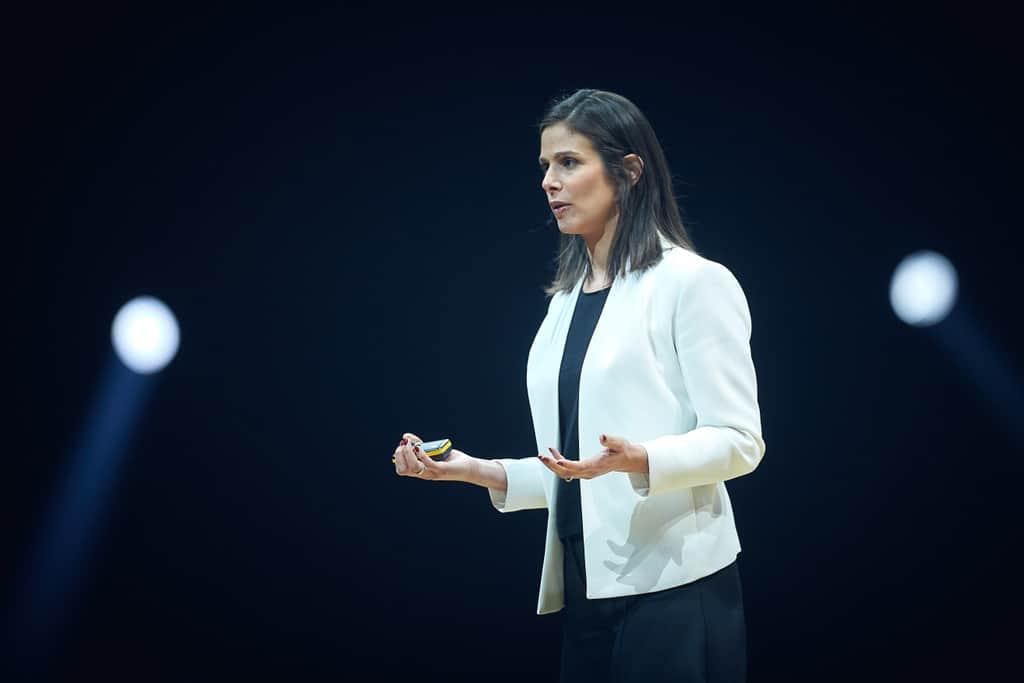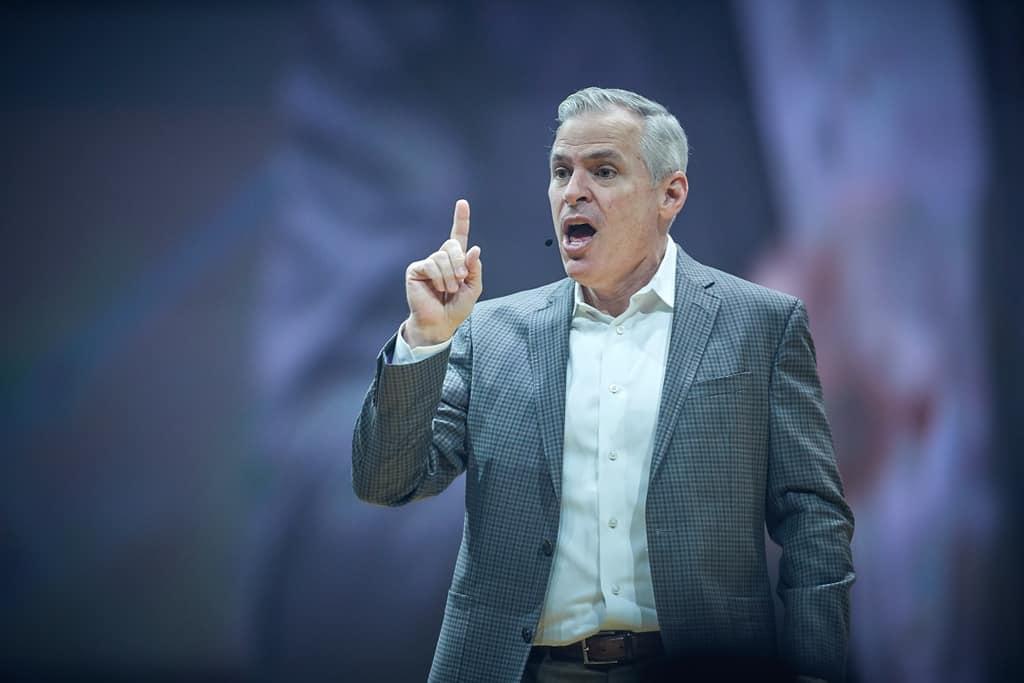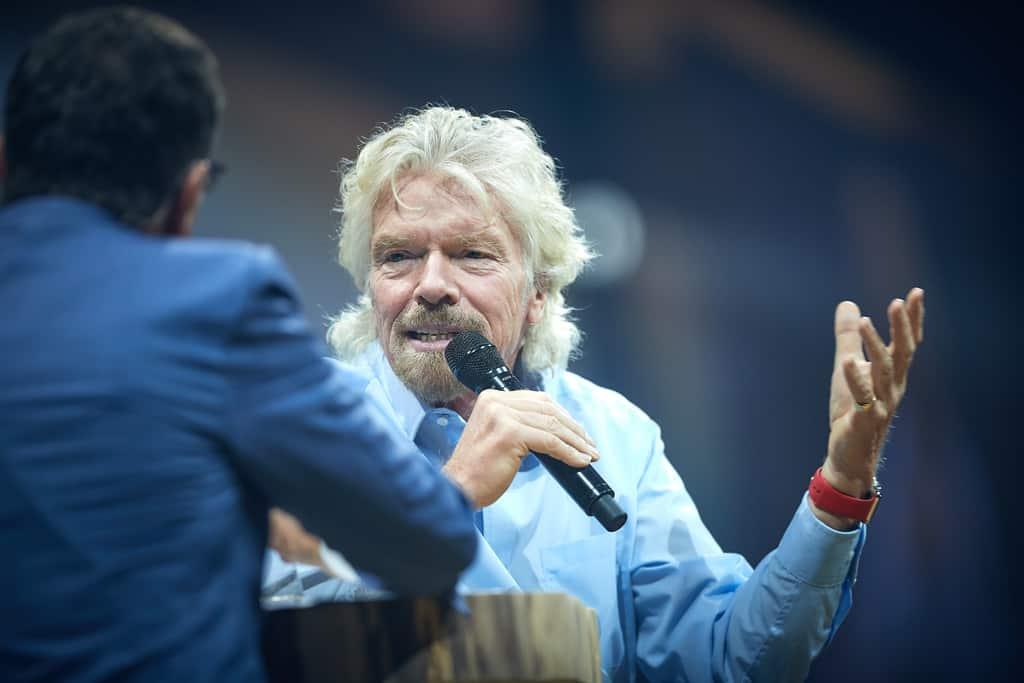4Feb2018
One of the first things that Rachel Botsman asks the crowd in attendance at the Nordic Business Forum 2017 is how many of them have been a guest at an Airbnb. She then asks how many have been hosts. She notes the sizable disparity between the two groups, but is not surprised, she says. “Because it requires more trust to be a host than a guest.”
Trust – it so happens – is Botsman’s main focus. For the woman who coined the phrase “collaborative consumption,” trust is a vital part of how she sees the new economy. We are, she says in “this new era of trust, where technology is transforming who we trust and where we place our trust.”
Her mission is to flesh out the workings of these three pieces of this new economy, along with value and scale – to show how they are changing with the pace of technological advancement and the dynamics of communication.
Rethinking value
To illustrate her point, Botsman tells the story of perhaps the first and most important company to operate in this new economy of trust. She tells the real story of eBay founder Pierre Omidyar – who attempted to sell a broken laser pointer on his personal website – complete with a picture of it in pieces. Within 24 hours, he received a bid of $13.83 from a person who collected broken laser pointers.
It was this encounter that caused Omidyar to take seriously the ability of the internet to auction things off effectively and efficiently. At that moment, Omidyar realized that there indeed is a kind of collector for every thing one can think of. What he also realized, Botsman says, is that technology was going to do two things:
- It will make more efficient the matching of supply and demand—of the haves and the wants.
- It will transform how we come to build and preserve trust.
This was in large part what laid the groundwork for what Botsman calls the collaborative economy. She defines it as “An economic system that unlocks the value of underused assets through platforms that connect haves and wants in ways that enable greater efficiency, empowerment, and access.”
This economy is not limited to businesses or even entrepreneurs, Botsman claims. In fact, it’s only limited to how a person thinks about value. Participants in this economy all have one thing in common, Botsman explains. “The question that they ask is: how can we extract new value from an existing asset?” That question is now being answered in a different way, by looking at something that hadn’t been exploited before: idleness. Idling Capacity refers to the untapped social, economic, and environmental value of underutilized or idle assets.
“What technology is doing is allowing us to take this value and make it liquid – in all sorts of interesting ways.” An empty room in a home becomes a room to sell for money. An empty seat in a car becomes an opportunity for profit. “The good thing about idling capacity,” Botsman says “is that it’s absolutely everywhere.”
To illustrate this point, she uses the story of Blablacar as the perfect example of the intersection of idling capacity and trust being harnessed appropriately by technology. Blablacar is the world’s leading long distance carpooling service, which allows drivers to be matched with people who are looking take the same journey as them.
The idea sounds crazy, but this crazy idea is now the preferred mode of transportation from London to Paris – transporting 4 million people per month. That’s almost double JetBlue and more than quadruple the Eurostar. What was once overlooked has become primed for profit.
The leap of trust
So how did this happen?
Botsman says that Blablacar created what she calls “a trust leap.” “A trust leap is when we take a risk to do something new or to do it differently from the way that we’ve done something before.” She gives the example of online bill paying vs. paper bill paying, or using self-driving cars vs. insisting on driving ourselves.
We’re doing things like this more often than we used to. Botsman emphasizes that point. “What we’re being asked today – and what technology is enabling us to do – is to leap faster and higher than ever before.”
As if to demonstrate this, Botsman asks the audience to participate in an experiment. Each person is to unlock their phones, and hand it over to their neighbor for 30 seconds. That person can do whatever they want during that time.
Botsman notes that people generally fall into one of three categories during an experiment like this. One group just doesn’t participate at all. A larger group participates but doesn’t really do anything with the other person’s phone. The third group dives right in – looking at the other person’s accounts, texting, tweeting, taking pictures, etc.
The thing about the collaborative economy is that we’re beginning to find out just how much of each group there his out there—and the distribution is not what many skeptics once thought.
Scaling in the new economy
Botsman tells a story of the time she had the chance to invest in Airbnb in its infancy but didn’t. She jokingly blames it on her husband – a barrister, who, when presented with the idea of strangers booking rooms in other strangers’ homes, found it to be unworkable. His answer was simple and reasonable: “Strangers are not going to trust each other.”
While this may sound reasonable, Botsman is quick to show that what Airbnb has done to prove those skeptics (like her husband) wrong is that people will trust one another – even when the online transaction leads to offline interactions. That is the leap of trust that Airbnb made over and above eBay. eBay only asked users to take a leap online. Airbnb asked users to take the leap offline as well, and be in the same space as a stranger. And people have taken that leap. And that leap is actually helping them scale.
Botsman points out that these companies are scaling by creating new markets and leveraging leaps of trust. “What [they] realized is that they can create a market for things that never had a marketplace before. They could take all of these fragmented assets and use technology to organize them in a new way.”
Companies like Airbnb are easily scalable because—unlike other companies that compete in similar industries—they are asset light. Airbnb doesn’t own a single room of the multitudes of them that their platform rents. Despite this fact, or more accurately because of it, Airbnb is now the second most valuable privately held hospitality brand in the world—a fact that Botsman doesn’t let her husband forget.
Botsman flashes a quote on the screen from a piece in TechCrunch by Tom Goodwin. It perfectly captures the spirit of this new kind of economy:
”Uber, the world’s largest taxi company, owns no vehicles. Facebook, the world’s most popular media owner, creates no content. Alibaba, the most valuable retailer, has no inventory. And Airbnb, the world’s largest accommodation provider, owns no real estate. Something interesting is happening.”
Botsman acknowledges that Goodwin and others who talk about this collaborative economy understand two of the three aspects that Botsman sees as important: value and scale. But they are missing the vital third element – something that has become the currency of this new economy: trust. “Most businesses that we interact with are built around money, and money only goes so far,” Botsman maintains. “Money is the currency of transactions. Trust is the currency of interactions.”
Not only is this currency becoming more common, but there is now more of it. Botsman describes the world of apps like Uber and TaskRabbit as “trust on speed.”
The evolution of trust
“As technology enables trust in new forms, we’re seeing a decline of trust in institutions.” This means governments, the media, NGOs. Surveys continue to show a lack of trust in these age-old behemoths. But Botsman is not pessimistic about it. She assesses that there’s just a mismatch going on. She also points out that “institutional trust was not designed for the digital age.”
What this means is that rather than trust flowing upward from people into institutions, it is being distributed among people through new technologies like social media and the blockchain. This is but the third form that trust has taken in its evolution – according to Botsman. She outlines the two previous forms of trust that preceded this new distributed kind.
Initially, humans had local trust – which existed in small villages and communities. It was reputation based and non-transferrable. Once people started moving to cities and engaging in trade, the need for intermediaries arose, and institutional trust was created. The primary vehicles of these were governments and corporate brands, which carried reputations across borders.
Now with advanced technology essentially shrinking the world, distributed trust has entered the game. Interactions between people are once again taking center stage. But this trust happens, Botsman explains, in “stacks” or “layers.”
The first layer is trust in the idea. For Uber, the idea is of someone other than a taxi driver picking you up. The second layer is trust in the company – that they can effectively manage the interactions and transactions and mitigate risk. The third layer is the trust in the individual with which you’re interacting. In the case of Uber, it’s your driver.
There is a concern here about just how we transact with our trust. Botsman tells the story of Jason Brian Dalton, an Uber driver who went on a shooting spree in Michigan, in the United States. During the time of the spree, as word spread on social media about who Dalton was, people still accepted rides from him, even after asking him if he was the guy whose name was being attached to the erratic driving and possible shootings. When these passengers were asked by police why they accepted rides from Dalton, they responded that they didn’t think Uber would send them such a person as a driver.
According to Botsman, this type of incident is an example of how we are choosing efficiency over diligence and outsourcing our trust. But she is also quick to point out that unlike other types of labor we might be able to effectively outsource to algorithms and apps, “efficiency is actually the enemy of trust. Trust needs friction. It needs us to slow down. It needs us to think about our decisions.”
To effectively navigate this new world, and this new economy, companies like Uber and Facebook are going to have to be proactive – to take measures to ensure that they can demonstrate that trust in them is warranted. They will also need to be there to react when there is a breach of that trust.
Botsman insists that we are still getting our bearings in this “third wave” of the relationship between technology and trust. The first wave was merely the sharing of information—which was fairly low risk. The second wave was transactional—buying things on eBay. This third wave is what Botsman calls “experiential.”
“The real challenge,” Botsman tells the Nordic Business Forum crowd, will be: “How to use technology not to accelerate trust, but to make better decisions – not to give our trust away.”
This article is a part of the Executive Summary of Nordic Business Forum 2017. Get your digital copy of the summary from the link below.


